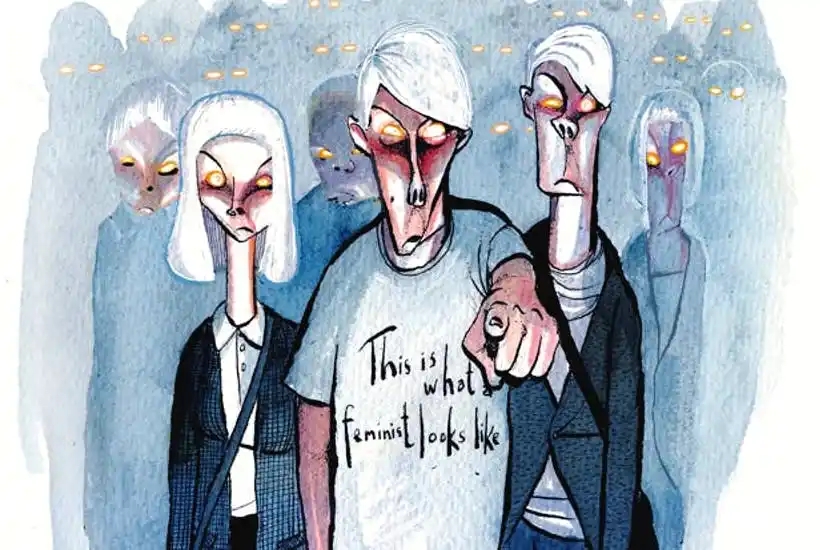Welcome to the divisive and somewhat sinister world of racial ‘microaggressions’. Loosely defined as ‘a subtle slight or action that leaves people from a minority group feeling upset, offended or uncomfortable,’ the person who has delivered the insult might even be oblivious they have caused offence. The latest manifestation of its chilling effect on workplace relationships came in an employment tribunal case brought by Christabelle Peters, a black British academic.
Peters, a lecturer in American cultural and political history, sued Bristol University over a series of microaggressions. One of her complaints was that the nameplate on her door did not have her ‘Dr” title on it. Her grievances included claims that her office furniture wasn’t delivered on time and that payslips were not delivered to her office pigeonhole. Peters also accused a senior lecturer of telling her ‘nobody gives a shit about Africa’ after she pitched a research idea about the continent.
Did the university partly help bring this case on itself?
The tribunal ruled in Bristol University’s favour: it found that the nameplate issue was an ‘admin error’ and heard that another lecturer experienced the same problem. The tribunal in Bristol was also told that nameplates at the university are often prepared by junior workers who were mostly unaware of who the lecturers were.
Did the university partly help bring this case on itself? After all, it has made a big song and dance of publishing a detailed guide to help staff and students identify, report and counter microaggressions. which it defines as ‘the everyday slights…that members of marginalised groups experience in their day-to-day interactions’. Peters presumably took this advice to heart. Among the microaggressions the guide lists are women ‘being mistaken for being in a role more junior than the role you hold’ or when ‘an assertive female manager (is) labelled as ‘bossy’ while her male counterpart is described as a ‘good leader’.
How has it come to this? The theory — if that is not too strong a word for something based on hunches and feelings rather than concrete evidence — is that microaggressions reinforce ‘white privilege’ and undermine a culture of inclusion.
The savants who promulgate this nonsense are the usual mix of antiracism ‘experts’, organisational psychologists and HR departments looking for quick and easy fixes to workplace culture and practice. They appear deliberately blind to the obvious flaws.
First and foremost, a mindless institutional witch-hunt, rooting out and punishing perceived racial slights through the simplistic catch-all category of microaggressions, is simply not the panacea it is cracked up to be. Training programmes based on such a flimsy premise might well succeed in marginally increasing awareness of ignorant comments, but at what cost? Surely a more likely outcome over time is a divisive and inflammatory workplace.
Daft ideas like this merely encourage a dangerous belief that one group is always the aggressor and the other the victim. Which is surely racist in itself. It is a statement of the blindingly obvious that assumptions, biases and aggression can, and do, often go both ways. Other equally damaging consequences flow. People will be tempted to keep their beliefs and opinions to themselves, especially if they think they are likely to be punished for any minor infringement however unintentional.
Most damning of all is the danger of a form of workplace apartheid taking hold because people will feel safer mixing with those from similar backgrounds. They might choose simply not to engage with anyone from an ethnic minority, just in case an innocent or well-meaning remark is overheard, misunderstood and reported.
This purportedly antiracist orthodoxy is slowly but surely taking a stranglehold in offices everywhere, but universities in particular are leading the charge. The overall impact is to heighten everyone’s sensitivity to any form of workplace slight, turning offices into factories of grievances, resentments and ultimately tribunal claims. That’s exactly where Peters ended up. She lost and rightly so — but no one should be surprised if there are other similar cases in the pipeline.
Got something to add? Join the discussion and comment below.
Get 10 issues for just $10
Subscribe to The Spectator Australia today for the next 10 magazine issues, plus full online access, for just $10.




















Comments
Don't miss out
Join the conversation with other Spectator Australia readers. Subscribe to leave a comment.
SUBSCRIBEAlready a subscriber? Log in